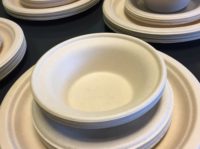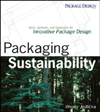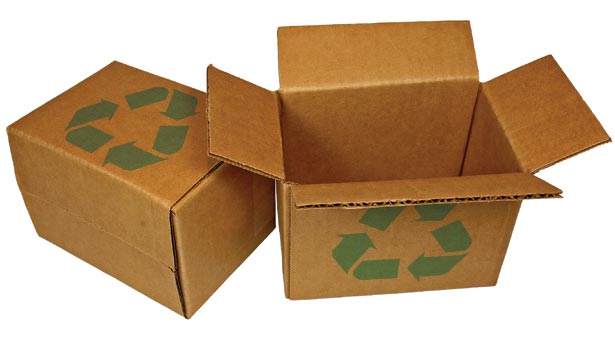Materials Technology: Sustainable Materials
Sustainable practices: Leading by example
Insights on the innovative materials and processes driving the paperboard packaging market.




Over the last decade, the paperboard industry has seen sustainable practices go from the occasional application to the industry standard, achieving new benchmarks in packaging innovation. True sustainability is a balance between environmental and social stewardship and economic practicality. Cost, performance, and environmental and social impacts must all be managed, beginning with packaging design and specification, moving to manufacturing and distribution, and then the end-of-life of a material.
We had the opportunity to speak with Kyla Fisher, the corporate sustainability director at PaperWorks Industries, Inc., an integrated packaging supplier. Fisher gives us a 360-degree look at sustainable packaging, from material trends and managing the overall manufacturing process to achieve sustainability, to the importance of accurately measuring results.
Food and Beverage Packaging:
Are you seeing an increased demand for certain types of sustainable materials?
Fisher: Absolutely. Our customers are asking for higher percentages of post-consumer recycled (PCR) content in paperboard than ever before. Many of the Fortune 1000 have set the goal of increasing PCR content in their materials and are looking for suppliers that can help them achieve a gradual increase over the next decade. In addition, some customers are looking for completely plastic-free and additive-free packaging solutions to address consumer concerns around estrogenic compounds leaching into food and beverage products, as well as at end of life disposal.
At PaperWorks, we are seeing more requests for biodegradable film in windows on cartons and in blister packs. However, the industry is still exploring the limits of biodegradable materials, looking to see how these materials will be handled in the recycling stream, and if our current collection and waste systems are adequately set up to handle degradable materials.
FBP: Can you give us an update on the materials regulatory front? Are there any new issues on the horizon?
Fisher: One issue on our radar is in the European Union, where there is growing sensitivity over chemical use in consumer products. Recently, there has been concern regarding the potential risks associated with mineral oil in food packaging. It has been argued that mineral oil saturate hydrocarbons (MOSH), which may be found in recycled packaging, are migrating out of the paperboard into other products. Concern over MOSH is a relatively new development that is still being addressed; however, the science behind the claims is being contested. The E.U. has deferred regulating MOSH until they have developed a more comprehensive process to assess the true impact of chemicals in food packaging.
It is a situation that we in North America are watching carefully. Recently, the U.S. has started looking at our own chemicals act, and the packaging industry is investigating the use of software tools to help measure the environmental effect of chemicals used in packaging.
FBP: What is Life-cycle Analysis and how is it being used?
Fisher: Life-cycle analysis (LCA) is a system that accounts for the material and energy used at every stage of the “life” of a product, including production, processing, packaging, use and retirement, giving us a comprehensive overview of a product’s environmental impact. Too often we quantify sustainability based on limited information, such as greenhouse gas emissions, or recyclability. Utilizing an LCA assessment, we include all available information to see the complete picture, helping identify where in a product lifecycle the biggest environmental impacts are, and targeting specific areas for improvement.
Unfortunately, LCAs are time-consuming, costly, and often unattainable for small to mid-sized companies. However, there are industry tools that build off these models and help provide similar information.
At PaperWorks we make frequent use of the Sustainable Packaging Coalition’s COMPASSTM software system. When working with a customer on a new design, we can plug in the dimensions and material used to see which design performs better against a series of LCA metrics. This is a great way to see the impact of a package across its whole lifecycle. It also drives collaboration with our customer to identify the areas they want to focus on to improve the sustainability performance of a package. This can mean anything from a design or material change, to taking a look at our supply or transportation logistics.
FBP: We’re seeing an increased trend towards retailer scorecards. How are these being used, and what are the impacts on industry?
Fisher: One of the more visible scorecards is Walmart’s Sustainability Scorecard. It forces Walmart suppliers to measure themselves against several criteria, including recycled content and recovery value. While it’s not an LCA, it makes use of LCA tools to assess the sustainability value of materials used, introducing the concept that sustainability is not just about material choices but also includes transportation, materials sourcing, and the end of life of a product. It also drives the concept of continuous improvement and innovation by scoring products on a bell curve against one another.
When supply chain influencers like Wal-Mart send the message that they will not do business with suppliers that do not foster sustainable innovation or internally implement sustainable business practices, these scorecards become powerful tools to drive change across the entire consumer products supply chain.
FBP: How has PaperWorks responded to this sudden demand for more and better packaging assessments?
Fisher: PaperWorks has developed its own assessments providing customers with carbon footprint measurements, effective shipping routes, and board savings. In addition, we use standard tools like SPC’s COMPASS for lifecycle analysis and the Walmart Package Scorecard Software.
FBP: There is a growing trend toward co-innovation between brand owners and suppliers to achieve more environmentally friendly packaging. How is this new dynamic changing the way you work with customers?
Fisher: In terms of productivity, the new dynamic is a game-changer. We are no longer just order-takers; we’re employing a more collaborative problem-solving approach. This means that we can work more closely with our customers to understand their needs and make actionable recommendations for continuous improvement.
Kyla Fisher is the sustainability director for PaperWorks Industries. Fisher currently sits as a co-chair of the AMERIPEN working group on Extended Producer Responsibility (EPR), which is seeking to help the industry understand and articulate a position and proposal to anticipated legislation in the United States. Additionally, she is currently engaged as a thought leader on the Paperboard Packaging Council’s Sustainability Task Force, and serves on numerous committees with the Sustainable Packaging Coalition.
Looking for a reprint of this article?
From high-res PDFs to custom plaques, order your copy today!













